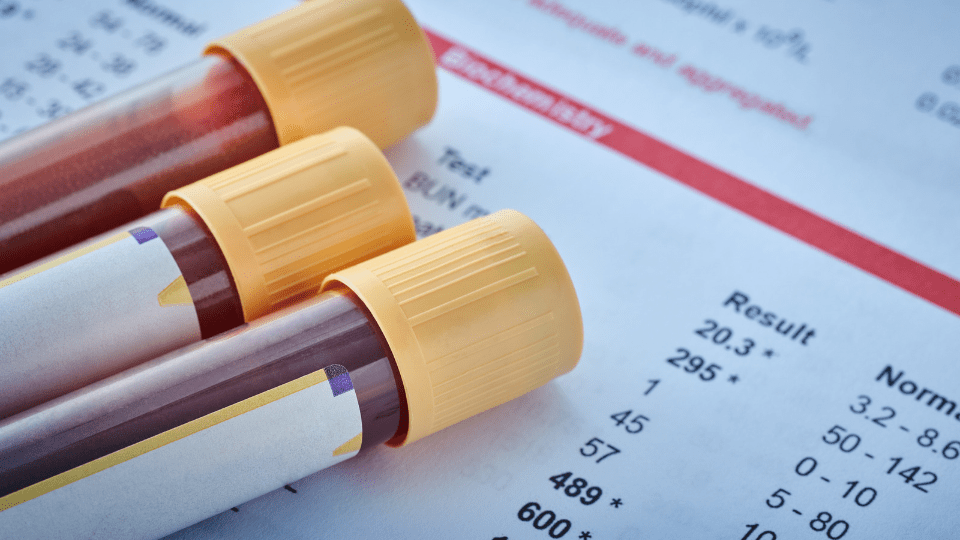Blood Test Booking
As part of National Stress Awareness month, we’re gonna take a look at the main different types of blood tests that are available for you to book or by, and what they reveal about your body. Halo Pharmacy have made blood test booking easy.
The main blood tests in the UK are as follows:
— Tropin
— Blood Glucose (Hb A1c)
— Cholesterol (Lipid Profile)
— Liver Blood Tests
— Full Blood Count (FBC)
— Group and Save (or Group and Screen) Test
— Urea and Electrolytes (U&E)
— Brain Natriuretic Peptide (BNP)
— Blood Gas Test
— International Normalised Ratio (INR)
Let’s now look at them a bit closer individually:

Troponin
When experiencing chest pain, a blood test is often conducted to measure troponin levels, a protein released into the bloodstream when heart muscle damage occurs. This test can help diagnose a heart attack, but low levels don’t necessarily mean one didn’t occur.
Women typically produce less troponin than men, which can lead to missed heart attack diagnoses. Research is being conducted on methods to measure this protein at lower levels, known as high-sensitivity testing. Troponin tests are always done in a hospital setting, and results are generated quickly to enable a diagnosis and treatment in the quickest time possible.
Blood Glucose (Hb A1c)
This test checks blood glucose levels, which aids in accurately diagnosing diabetes and guiding doctors to the best treatment. If levels are slightly elevated but don’t meet diabetes criteria, a pre-diabetes or ‘borderline’ diabetes diagnosis may be given. Lifestyle changes, like losing weight, can help bring these levels back to normal. A 12-hour fasting period might be required before this test.
Need to speak to one of our Healthcare Professionals about a blood test? Simply get in touch!
Cholesterol (Lipid Profile)
This test, done at a GP surgery or hospital after a heart attack, measures total cholesterol, ‘good’ and ‘bad’ cholesterol, and triglyceride levels. If results are abnormal, statins may be prescribed to lower the risk of heart attack or stroke.
The test is also useful for monitoring medication effectiveness in reducing ‘bad’ cholesterol and determining if dosage adjustments are needed. Although many people only need annual testing, more frequent monitoring may be required for those with persistently high cholesterol despite treatment, or a lipid management specialist may be consulted.
Liver Blood Tests
Previously called liver function tests (LFTs), these tests ensure the liver is functioning correctly. Various enzymes and proteins are examined, with higher or lower levels indicating possible liver damage. Abnormal test results do not necessarily indicate liver dysfunction.
Full Blood Count (FBC)
This test examines specialized blood cells and can detect anaemia, infections, or certain viral conditions like myocarditis.
Group and Save (or Group and Screen) Test
This test is performed if a blood transfusion is anticipated, such as during surgery or in severe anaemia cases. It determines blood group and screens for antibodies that could affect transfusions. Conducted at a hospital pre-assessment clinic or during an emergency admission, the test must be completed within 72 hours before a potential transfusion and may be repeated if necessary.

Urea and Electrolytes (U&E)
This test measures blood electrolytes, like sodium (salt), potassium, and magnesium. Abnormal heart rhythms can result from imbalanced levels, so adjustments are crucial. Urea, a protein produced by the body and broken down in the kidneys, can indicate kidney function issues if present in higher-than-normal levels, which can also impact heart health.
Some heart medications, such as ACE inhibitors, can affect kidney function, so this test helps doctors determine if it’s safe to adjust dosages based on the patient’s condition and test results.
Brain Natriuretic Peptide (BNP)
This test can diagnose or determine heart failure severity and can be performed by a GP or in a hospital. If symptoms of heart failure are present, such as swollen ankles or shortness of breath, a positive test result can enable early initiation of appropriate medications.
Blood Gas Test
Blood taken from an artery in the wrist is sometimes tested for oxygen and carbon dioxide levels and chemical balance. Typically conducted in settings like emergency departments and intensive care units, this test is used for patients with breathing difficulties or lung issues.
International Normalised Ratio (INR)
For those taking warfarin (an anticoagulant medication), maintaining blood clotting levels within the range specified by a medical specialist is crucial. The test essentially measures the duration required for blood to clot. Patients can visit an anticoagulation clinic for testing, or some general practitioners and community nurses offer this service.
Test results assist doctors in determining the appropriate warfarin dosage and the frequency of subsequent blood tests. Achieving the optimal level may take some time, resulting in dosage adjustments.
Some individuals utilise personal INR monitoring kits, which are especially beneficial for those who find it challenging to attend regular testing sessions.
Blood Test Booking made easy
If you’re looking for more information regarding a specific test, then please get in touch with our expert pharmacists, who will gladly talk you through them.
This blog post was written on behalf of Halo Pharmacy by Pharmacy Mentor.

